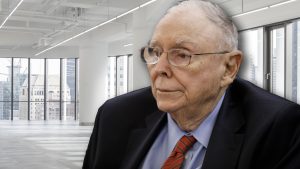
Charlie Munger, the vice chairman of Berkshire Hathaway, stated in a recent interview that American banks are burdened with poor-quality commercial real estate loans. His comments arrive amid the collapse of three major U.S. banks and the expected seizure of First Republic Bank by the federal government. Despite the potential challenges, Munger emphasized that the current situation is not as severe as the 2008 financial crisis, stating that “it’s not nearly as bad as it was in 2008.”
U.S. Banks Saddled With Poor-Quality Commercial Real Estate Loans, According to Charlie Munger’s Latest Interview
The renowned investor and vice chairman of Berkshire Hathaway, Charlie Munger, spoke to the Financial Times (FT) in an interview published on April 30, 2023, where he discussed potential issues facing the U.S. banking system.
During the previous financial crisis, Berkshire Hathaway provided capital injections to Bank of America and Goldman Sachs. However, the FT interview noted that the conglomerate holding company has not made any comparable moves amid recent events, including the failures of Silicon Valley and Signature Bank last month.
“Berkshire has made some bank investments that worked out very well for us,” Munger stated. “We’ve had some disappointment in banks, too. It’s not that damned easy to run a bank intelligently, there are a lot of temptations to do the wrong thing,” the investor added.
The 99-year-old American businessman discussed some of the challenges facing financial institutions today. Munger specifically highlighted the amount of commercial property currently held by U.S. banks.
According to sources, American banks hold nearly $1.5 trillion in debt, which is due by the end of 2025. The decreasing value of this property has raised concerns, compounded by the ten consecutive federal funds rate increases since last year. “A lot of real estate isn’t so good any more,” Munger remarked.
The Berkshire vice chair added:
We have a lot of troubled office buildings, a lot of troubled shopping centres, a lot of troubled other properties. There’s a lot of agony out there.
Following the publication of Munger’s interview, Jim Bianco, the president of Bianco Research, tweeted about the investor’s remarks. Bianco stated that “Buffett is the GOAT largely because he has invested in banks for over 50 years. No one understands them better. So, I have noted his absence in all the happenings in the regional banks in the last two months. He is not investing, and, to me, this speaks volumes.”
Bianco added:
Munger may have said the reason why.
Loan quality is a critical factor for American banks, alongside undercapitalization and the inability to meet obligations. If a bank makes too many bad loans, it can end up losing a significant amount of money, similar to what happened during the 2008 financial crisis.
Nevertheless, during his interview with FT, Munger expressed optimism that the economy’s current troubles will not be as severe as they were back then. “It’s not nearly as bad as it was in 2008,” Munger said. “But trouble happens to banking just like trouble happens everywhere else. In the good times, you get into bad habits . . . When bad times come they lose too much.”
What do you make of Charlie Munger’s remarks about the state of U.S. banks and their exposure to poor-quality commercial real estate loans? Share your thoughts about this subject in the comments section below.
Image Credits: Shutterstock, Pixabay, Wiki Commons
Disclaimer: This article is for informational purposes only. It is not a direct offer or solicitation of an offer to buy or sell, or a recommendation or endorsement of any products, services, or companies. Bitcoin.com does not provide investment, tax, legal, or accounting advice. Neither the company nor the author is responsible, directly or indirectly, for any damage or loss caused or alleged to be caused by or in connection with the use of or reliance on any content, goods or services mentioned in this article.
Source: https://news.bitcoin.com/charlie-munger-raises-concerns-over-troubled-commercial-property-loans-at-us-banks/